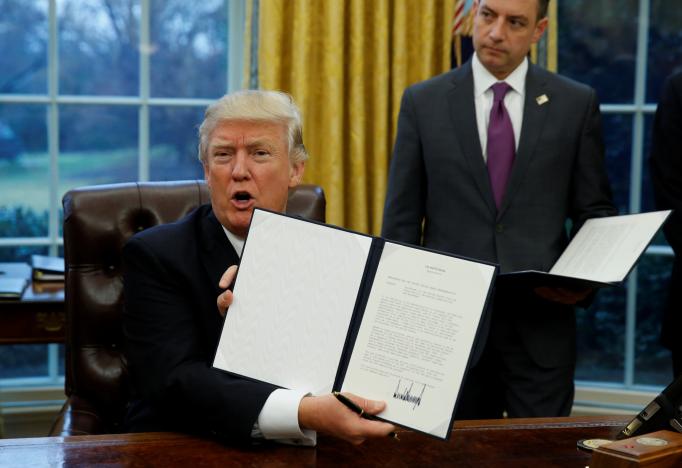Washington- U.S. President Donald Trump signed a series of executive actions on Monday — the actions implement a federal employee hiring freeze, formally withdraw the U.S. from the Trans-Pacific Partnership (TPP) trade deal and reinstate a GOP-backed policy regarding foreign aid and abortion funding.
The U.S. decision to withdraw from the TPP is one of Trump’s to-do list that aim at reconsidering several U.S. trade deals and implementing the slogan endorsed by him “America first.”
TPP was signed by former U.S. President Barack Obama in February 2016 after two-year negotiations and it includes 12 countries (U.S., Japan, Malaysia, Vietnam, Singapore, Brunei, Australia, New Zealand, Canada, Mexico, Chile and Pero(.
The deal aims at underpinning economic relations and reducing custom fees – Obama signed it but it was not approved by the Congress. Several lawmakers objected over the deal, primarily Senator Rand Paul.
By this step, Trump sends a message to Democratic senators that his speeches during the electoral campaign were not only promises but will become actions during the first days of his presidency.
Analysts undermined the impact of withdrawing from the deal because TPP was never applicable since it wasn’t approved by the Congress, therefore withdrawing from it will not have prompt effect on U.S. economic policies.
In a related matter, Trump pledged to reconsider North American Free Trade Agreement (NAFTA): a trade agreement among the U.S., Canada and Mexico signed in the presidential term of Bill Clinton in 1994.
During the swearing-in, Trump expressed his willingness to meet with Prime Minister Justin Trudeau and Mexican President Enrique Peña Nieto to restructure this agreement.
However, Woodrow Wilson Center revealed that withdrawing from NAFTA will cost U.S. more than five million jobs that directly rely on free trade with Mexico, not to mention that several U.S. and Mexican companies invested millions of dollars and developed plans based on facilities provided by NAFTA.
